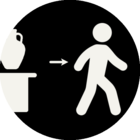In the JSON transformer documentation, there is a sub-section on JSON Query, which states:
JSON Property Expressions
A property expression is a structure expression as described above, followed by a . (dot) operator and a property name. Currently, the only supported properties are type and size. The type property returns the type of the JSON value referred to by the JSON structure expression. For example, if the outermost JSON element is an array, and the first element of the array is a string, then the expression json[0].type would have a value of string. The size property, which can only be applied to an array, returns the number of elements in the array.
For the life of me, I cannot find any other documentation on this and am unable to get it working. I tried a similar example to the one described above ("columns" is an array) but I get the following error:
The JSON query 'json["columns"].size' cannot be used to produce features. String expressions and property expressions cannot be used in the query
Any thoughts? If it cannot be used in a query, then where and how can it be used? I would like to extract the size of the array without having to use a ListElementCounter right after. Thanks.
Best answer by ebygomm
View original



